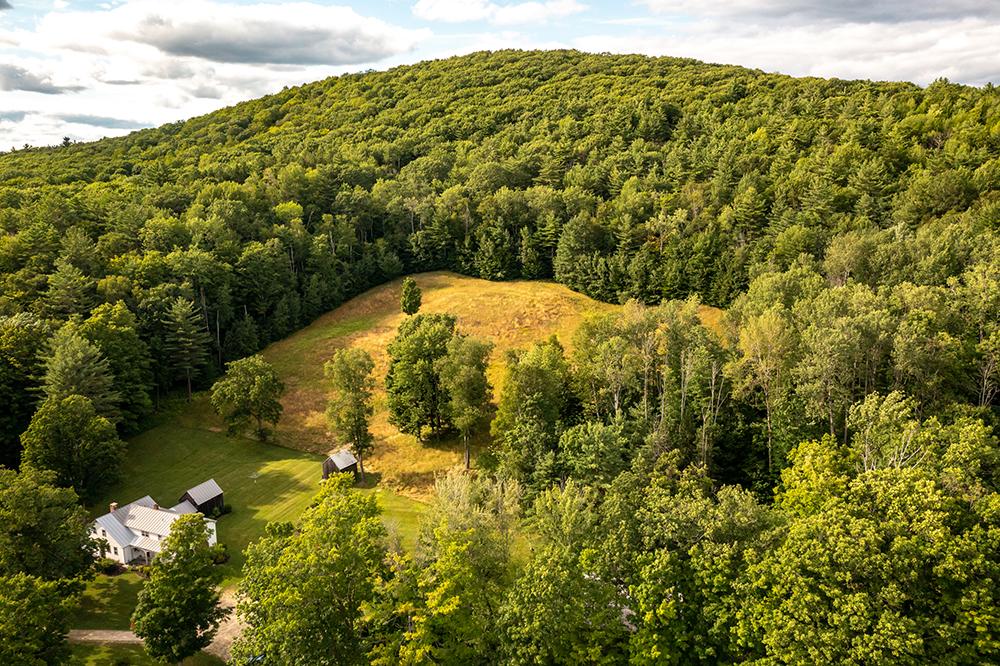Wallace and Jerryne Cole donate a conservation easement over 203 acres abutting the southern boundary of the Yatsevitch Forest
- Tags:
- Land Conservation,
- Wildlife

A view from above the conservation easement, an addition to Yatsevitch Forest, pictured in fall 2022. (Photo: Ryan Smith)
CORNISH, NH (March 22, 2023) –The Society for the Protection of New Hampshire Forests has extended the protected lands in Cornish by working with generous landowners, Wallace and Jerryne Cole, who donated a conservation easement over 203 acres, known as Paget Farm, directly abutting the southern boundary of the Yatsevitch Forest.
In 1995, Mike Yatsevitch had a vision for conserving his family lands in Plainfield and Cornish. The Michael M. and Claudia Yatsevitch Forest was first established with an 800-acre donation of land to the Forest Society.
“If only Mike could see the Yatsevitch Forest today,” states Jack Savage, president of the Society for the Protection of New Hampshire Forests. “Through a series of land and conservation easement donations and purchases, and thanks to collaborations between the towns, land trusts, private landowners and philanthropic donors, more than 1,300 acres of contiguous forestland has been conserved surrounding that original 800 acres, creating a block of 2,172 acres.”
The Cole family’s land, nestled between Dodge Hollow Road and Paget Road in Cornish, extends down the southern slope of Fernald Hill, and consists of mixed northern hardwood forest of sugar maple, oak, beech, and birch. The soil type on part of Yatsevitch Forest is contiguous to the Cole’s property and contains a similar unique, rich habitat more common across the Connecticut River in Vermont than in New Hampshire.
The conservation easement now fully encompasses the rich forest habitat in the area. Large, interconnected blocks of forested habitat are important to the movement and migration of wildlife, including wide-ranging species like black bear and moose and the woodlands, fields and winding dirt roads of Cornish are fundamental to the character of this beautiful Connecticut River community that has inspired so many writers and artists.
The conservation easement prevents future subdivision of the 203 acres and will not allow further development, but does allow recreational use and sustainable forestry, and protects water resources and other natural attributes on the property. The Coles’ existing house and outbuildings are not included in the easement area.
“Our property is a unique part of Cornish,” states Jerri Cole. “Integral to our decision to conserve our property was to address climate change. We wanted to conserve, protect, and enhance a forest capable of carbon sequestration to mitigate climate change and to enhance biodiversity. Along with the recreational values and the protection of open space, growing and maintaining a mature forest that maximizes the amount of carbon sequestered from the atmosphere and stored in the soils or plant biomass across Paget Farm’s landscape will be a primary consideration for future forest management plans.”
Individual donors and the Cornish Conservation Commission were instrumental in conserving the land providing for the long-term stewardship of the property as well as project costs.
“We ensured that our partnership with the Forest Society was established through the Cornish Conservation Commission because we first wanted the Town of Cornish to be fully aware, engaged, and supportive of our vision for the future of Paget Farm,” adds Cole. “The Cornish Conservation Commission’s involvement was integral to the seamless working relationship between the Forest Society, the commission, and ourselves and we thank them for their support.”
“This is a truly special property that satisfies all of our land conservation priorities,” states Corey Fitch, chair of the Cornish Conservation Commission. “We are grateful for the Cole family’s generosity and Forest Society’s dedication to ensure that future generations can continue to enjoy all that it has to offer.”
ABOUT THE FOREST SOCIETY
The Forest Society is a non-profit land trust and forestry organization established in 1901. The Forest Society owns 191 forest reservations constituting nearly 60,000 acres that provide wildlife habitat, walking trails, and watershed protection in 105 New Hampshire communities. In partnership with private landowners, the Forest Society protects an additional 135,000 acres by holding more than 750 conservation easements statewide.
